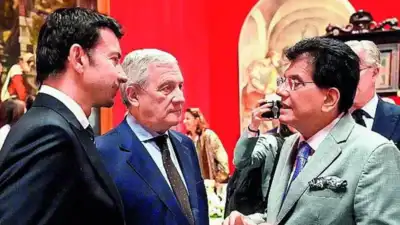
India has stepped up efforts to finalise a comprehensive free trade agreement with the European Union, holding three high-level meetings in just over a month to push negotiations forward.
Commerce and Industry minister Piyush Goyal met EU Trade Commissioner Maros Sefcovic three times in 35 days, underscoring the urgency both sides attach to concluding the long-pending trade pact.According to ANI, Goyal, who is on a two-day visit to Italy, said the frequency of discussions demonstrates a shared commitment. “We have held three meetings in 35 days. It shows our shared commitment to the FTA... we are trying to do it faster,” he told reporters on Thursday.The engagements included meetings on May 1 and May 23 in Brussels, followed by a third round on June 2 in Paris. India’s push comes after recently signing trade deals with the UK and the European Free Trade Association (EFTA), which includes Iceland, Liechtenstein, Norway and Switzerland.The India-EU trade talks were revived in June 2022 after being stalled for more than eight years. Discussions are also underway for an investment protection agreement and a geographical indications pact alongside the FTA.
Political momentum peaked in February when Prime Minister Narendra Modi and European Commission President Ursula von der Leyen agreed to aim for an agreement by the end of the year.“We are making rapid progress on the very vibrant FTA, which would open opportunities for businesses on both sides,” Goyal said, describing the proposed deal as “very strong and mutually beneficial.”Despite the recent push, Goyal noted that current bilateral trade with Italy remains “low and sub-optimal” at about $15 billion in goods, signalling more room for growth.Italian Deputy Prime Minister and Foreign Minister Antonio Tajani echoed the sentiment, calling India and Italy “natural partners.” He said Italy is keen to increase exports to India and attract more Indian investment into the country.“Our goal is to reduce trade barriers,” Tajani said, in response to a question on US tariffs on steel and aluminium. He added that “duties are never positive” and emphasised the importance of easing global trade restrictions.The accelerated pace of India-EU engagement comes at a time when both sides are looking to diversify trade ties and reduce reliance on other major economies. A successful agreement could not only reset India’s trade flows with Europe but also serve as a model for future partnerships across the region.

 1 day ago
3
1 day ago
3








 English (US) ·
English (US) ·